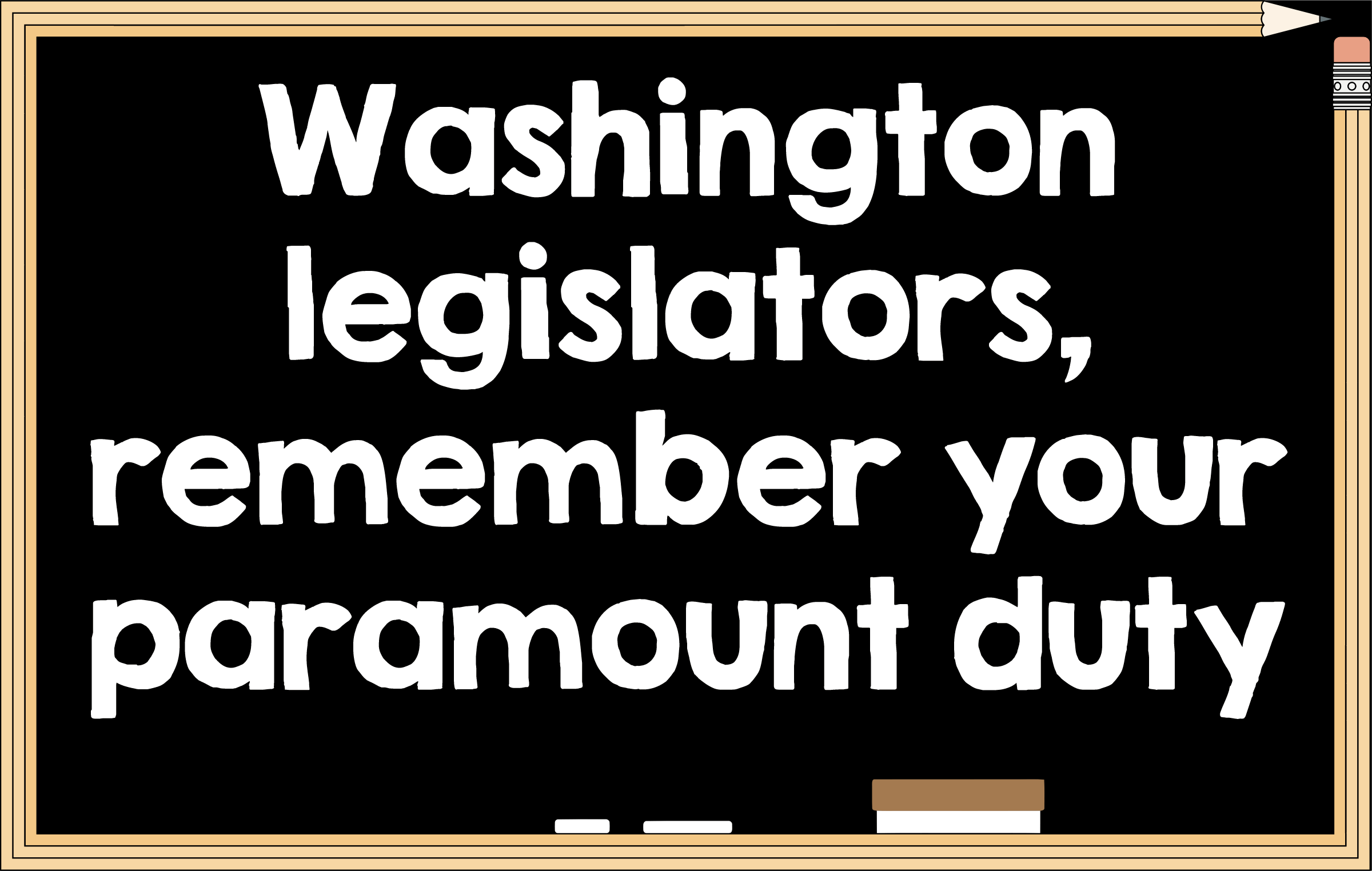Twelve years ago, Washington voters said yes to amending the Constitution of Washington State to change the threshold for passage of school levies from three-fifths (60%+) to a simple majority, the only true majority there is.
The passage of this amendment was a big win for majority rule, one of the bedrock principles of democracy. However, the amendment did not extend to bonds, and as a consequence, school districts’ efforts to secure financing for new or improved buildings must always receive a three-fifths vote of approval in an election with a minimum turnout of forty percent… the so-called sixty/forty (60/40) rule.
The sixty/forty rule has been getting in the way of Washington’s adherence with another often-cited, vitally important provision of the Constitution… the preamble of Article IX, which clearly states that it shall be the paramount duty of the state to amply provide for the education of all youth within in its borders.
Time and again, school districts in Washington have seen bond propositions go down to defeat despite earning robust, healthy majorities.
And that’s because, thanks to the sixty/forty rule, 59% just isn’t enough to pass a bond. The sixty/forty rule undemocratically puts a submajority in charge of the outcome, which would be unthinkable in electoral politics. (When a candidate gets 59% of the vote, that’s considered to be a landslide, an epic win.)
Majorities of voters are sufficient to elect candidates, pass school levies, and decide statewide ballot measures, including constitutional amendments. Yet bond propositions for schools remain subject to a higher threshold.
This needs to change.
Happily, the Legislature is currently considering a constitutional amendment that would do away with the sixty/forty rule for school bonds. Requested by the Superintendent of Public Instruction, Chris Reykdal, the amendment has been introduced in the House as HJR 4203 and in the Senate as SJR 8201.
This past week, students from the Bethel School District showed up to explain to legislators why passing this amendment is imperative, winning the admiration and applause of the editorial board of the Tacoma News Tribune:
Last year, twenty-eight school bonds around the state failed, even though all but four had more than fifty percent support.
In Tuesday’s election, school bonds in Clark, Snohomish and Skagit counties were falling short despite winning a majority.
Of all the arguments against the supermajority we’ve heard, none can top the Bethel students who testified before a legislative committee Thursday. The teens eloquently called for a return to a simple-majority rule for school bonds, which was part of Washington’s original Constitution ratified one hundred and thirty years ago.
Allowing 41 percent of voters to stand in the way of safe, healthy and educationally competitive campuses is undemocratic, they said.
“In our government classes they teach us in high school, they call it the tyranny of the minority,” Sam Lafferty, a student at Graham-Kapowsin High School, told the House Education Committee.
Bravo, Sam. Bravo! You and your peers clearly understand the arguments that Hamilton and Madison were trying to convey in the The Federalist.
You get it: in a democracy, decisions should be made by the many, not a few.
It’s truly a shame that Tim Eyman and the Washington Policy Center don’t get it. They remain obsessed with sabotaging majority rule in our state.
Our founders would be shaking their heads at their behavior.
In 1889, when a convention of mostly Republican men was drafting the document that would ultimately become the Constitution of the State of Washington, they faced a decision: what should be the threshold for passage of bills in the House and Senate? After thinking the matter over and deliberating at length, they concluded that the only sensible threshold was a majority of each chamber.
So they wrote what became Article II, Section 22, which states:
SECTION 22. PASSAGE OF BILLS. No bill shall become a law unless on its final passage the vote be taken by yeas and nays, the names of the members voting for and against the same be entered on the journal of each house, and a majority of the members elected to each house be recorded thereon as voting in its favor.
At the time Washington became a state, there was no sixty/forty rule for bond propositions in the Constitution. That was added decades later. Now, we have an opportunity to undo that mistake and allow majority rule to govern the fate of our school bonds. This must become a bipartisan priority in the Legislature.


Not everyone believes a simple majority should be enough to raise or create taxes.
That’s true, Denise. But our founders certainly believed that a majority of greater than fifty percent ought to be the threshold for ordinary legislation, including revenue bills.
If you believe a submajority should get to control the outcome of revenue bills, then why not other kinds of bills?
And why stop at two-thirds when we can require, say, nine-tenths?